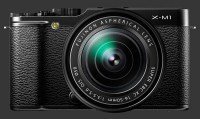Best Digital Cameras of 2014
Introduction
Here we present the best digital cameras of 2014. Each winning camera is chosen as the best-in-class in its respective category among models currently availableAs of November 2014. Some may not be available in all markets yet.. Several winning digital cameras managed to keep their positions from last but there has been a shake up in the premium camera market. Runner ups are chosen only when offering a very similar performance or distinct advantage.
Explosive growth among mirrorless cameras brought a number of models into new categories with matching prices. For this reason, we categorized these digital cameras into the same levels as DSLRs: entry, advanced and professional. As with DSLRs, image-quality is very similar across categories but features and controls are the greatest differentiators.
Emphasis for selection is on image quality above all else. All models below are chosen for outstanding image quality, feature set and performance relative to cameras in the same category. If you are not sure which category would suite you better, consult the Choosing Basics section of the buying guide.
Choices can transcend boundaries between digital camera types and so, like last year, the best performing camera for different photography subjects is awarded in its own section. Winners were chosen for outstanding performance regardless of camera type or price. Consult this list if one type of photography dominates your art.
Ultra-Compact
The ultra-compact is the most portable type of digital camera. It fits in most pant pockets and can be taken unobtrusively anywhere. While it compromises in image quality, ergonomics and features, it delivers more photo opportunities simply because it is rarely left behind.
Ultra-compact cameras are under more pressure than ever due to the advent of high-resolution cell-phones. Virtually no new models were introduced last year.
Best Ultra-Compact 2014
Fujifilm XQ1
This ultra-compact uses a larger-than-usual 12 MP sensor which delivers improved image quality over its modern peers. The Fujifilm XQ1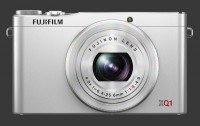
Fujifilm XQ1 features an ultra-wide-angle 4X optical zoom lens equivalent to 25-100mm with an bright F/1.8 aperture at the wide end. This lets it gather 2 to 4 times more light than other ultra-compacts and gives it an unrivaled lead in low-light performance.
This digital camera is also the most ergonomic ultra-compact. Its dual control-dials give it efficient access to its full manual-controls. Framing is via a sharp 3" LCD with 920K pixels and yet it manages to squeeze-in built-in WiFi too.
| What you will like |
|---|
| Bright ultra-wide-angle lens |
| Very low image-noise |
| Superior dynamic-range |
| Ultra-fast and accurate Phase-Detect AF |
| 12 FPS Continuous drive |
| Excellent manual-controls |
| What you may not like |
| Lens dims quickly when zooming in |
| Strong edge softness |
| Still has a small sensor |
| No hand-grip at all |
| Very short battery life |
Travel-Zoom
Small ultra-zoom digital cameras are plentiful. With sizes varying between ultra-compact and compact, these models pack at least 8X optical zoom. Just a few years ago, this was only possible with much larger models. Inevitably the size of the lens determines the compromise between focal-length and optical quality, although sensors are roughly the same now across most fixed-lens cameras from a given company.
Best Travel-Zoom 2014
Fujifilm Finepix F1000 EXR
The impressive Fujifilm Finepix F1000 EXR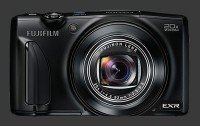
Fujifilm Finepix F1000 EXR brings back Phase-Detect AF to the compact F-series where this technology started. This cameras features a unique 16 megapixels EXR CMOS II sensor that delivers a class-leading dynamic-range and comparatively low image-noise while also incorporating ultra-fast AF at the sensor-level.
Its 20X ultra-wide-angle optical zoom lens has built-in stabilization, reaching 500mm in a camera that closes down to a mere 1.5" thick. It sports advanced features with full manual-controls, 1080p HD video capture, ultra-fast 11 FPS continuous drive and WiFi.
| What you will like |
|---|
| Stellar dynamic-range |
| Low image noise |
| Impressive optical performance |
| Superb stabilization |
| Class-leading fast autofocus |
| What you may not like |
| Complex feature interactions |
| No physical aperture |
| Short battery-life |
| AF slower in video |
Ultra-Zoom
Large cameras are very capable. In addition to a complete feature-set, these cameras can be equipped with outstanding optics and ergonomically-designed bodies. Compared to DSLR cameras, large cameras provide WYSIWYG live-preview with relatively fast auto focus and are not prone to sensor dust. Their only true limitation is having a fixed lens.
Best Ultra-Zoom 2014
Panasonic Lumix DMC-FZ1000
The Panasonic Lumix DMC-FZ1000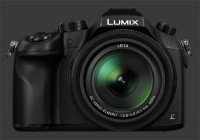
Panasonic Lumix DMC-FZ1000 is an advanced ultra-zoom which features a 20 megapixels 1" CMOS sensor, besting the previous ultra-zoom champion in terms of image-quality. It offers a stabilized ulra-wide 16X optical zoom with F/2.8-4 maximum aperture and a very sharp 0.39" EVF with 2.4 megapixels.
This ultra-zoom is very feature-rich with full manual-controls, including a fly-by-wire focus, digital level and 12 FPS high-speed drive. It is also the only ultra-zoom to record 4K Ultra-HD video at 3840x2160. It also records full 1080p at 60 FPS with stereo sound input. It includes both a built-in flash and standard hot-shoe as well as built-in WiFi.
| What you will like |
|---|
| Low image noise |
| Excellent dynamic-range |
| Very good image sharpness |
| Fly-by-wire zoom/focus lens ring |
| Solid build quality |
| What you may not like |
| Modal single-dial interface |
| EVF and LCD not Exposure-Priority |
| Below average battery-life |
| Bulky even for an ultra-zoom |
Premium Compact
Premium compacts are digital cameras with an extensive feature set in a relatively compact body. They rarely fit in a pocket but neither do other cameras with the same feature set. Sensor-size has been getting bigger among premium compacts, delivering very good image quality.
Premium cameras have shown strong growth with new models from every manufacturer. This category easily is the most difficult to assess because each model offers such different compromises.
The similar price of premium compacts and mirrorless digital cameras is causing some dilemma. Mirrorless cameras are clearly more versatile yet that brings the hassle of changing lenses and sensor dust, which not everyone is willing to deal with. On the hand, premium compacts deliver an all-in-one camera with outstanding image quality.
Best Premium Compact 2014
Panasonic Lumix DMC-LX100
With the Panasonic Lumix DMC-LX100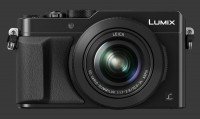
Panasonic Lumix DMC-LX100, Panasonic may have produced the perfect premium compact. The LX100 clearly stands outs from the competition by its image-quality and careful choice of features.
This premium compact captures 12 megapixels images at multiple aspect-ratio4:3, 3:2 & 16:9. without loss of resolution or viewing-angle, using a 16 MP Four-Thirds sensor slightly cropped to a 2.2X FLM. Its ultra-bright 24-75mm F/1.7-2.8 optical zoom lens therefore always allows for ultra-wide coverage.
The Panasonic Lumix DMC-LX100 offers extensive controls, including dual control-dials and plenty of buttons. It features a built-in large 2.8 MP EVF and 3" LCD with 920K pixels. The LCD is fixed for extra durability and avoid problems of many modern digital cameras, particularly those with an EVF, by not being touch-sensitive.
While not the most compact, in the interest of size, Panasonic skipped the built-in flash which will do more good since it has ruined more images than other camera features.
The LX100 is highly feature rich with, not only a full set of manual-controls, but also White-Balance Fine-Tuning, 7-Frame AEB, 11 FPS Continuous Drive and even 4K Ultra-HD video capture.
| What you will like |
|---|
| Excellent image-quality |
| Bright maximum aperture |
| Very good sharpness |
| Excellent multiple aspect-ratio sensor |
| Compact with 4K Ultra-HD |
| Excellent EVF sharpness |
| Superb build quality |
| What you may not like |
| Short zoom reach |
| EVF and LCD not Exposure-Priority |
| Expensive among premium cameras |
| Larger than competitors |
Entry Mirrorless
Mirrorless digital cameras are designed to bring the versatility of interchangeable lenses to a small form-factor while delivering high image quality. The latest generation of mirrorless cameras succeeded rather well, even matching the image quality some modern DSLRs. They have also taken great strides in improving speed which initially lagged considerably behind.
Many entry-level models offer the same image-quality as high-end ones because they share the same sensor, only in a smaller body with fewer controls and less durable components.
All mirrorless cameras kept their leading position from last year.
Best Entry-Level Mirrorless 2014
Fujifilm X-M1
Fuji started at the top of mirrorless cameras with the Fujifilm X-Pro1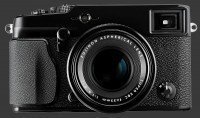
Fujifilm X-Pro1 and has been moving down by reusing sensors designed for their high-end models. The X-M1 uses the same stunning 16 megapixels X-Trans CMOS II sensor as the X100S above and all but one of their mirrorless offerings.
It delivers class-leading image-quality and speedy Phase-Detect autofocus in a compact body. Still, unlike most entry-level units, the X-M1 offers dual control-dials and a traditional mode-dial. Its compact body lacks room for a viewfinder which is typical for this level of camera.
The Fuji X-M1 manages to exceed the image quality of most cropped-sensor DSLRs and produces sharp images with very low noise and superb colors.
| What you will like |
|---|
| Extremely low image-noise |
| Excellent sharpness |
| Great color accuracy |
| Good number of controls |
| Solid build quality |
| What you may not like |
| Slow autofocus in low-light |
| Limited selection of lenses |
| No option for an EVF |
Advanced Mirrorless
Fuji designed its X-series of mirrorless cameras for advanced shooters and launched the original X-Pro1 with a set of high-end prime lenses, each featuring a true aperture ring. The camera itself offered mechanical dials for most controls and a classic design with a unique hybrid viewfinder.
Best Advanced Mirrorless 2014
Fujifilm X-E2
The Fujifilm X-E2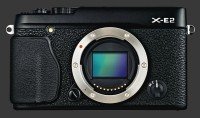
Fujifilm X-E2 is the ultimate mirrorless from Fuji. It offers the latest generation 16 megapixels X-Trans CMOS II sensor paired with a fast EXR II processor.
As described above, this sensor delivers ultra-sharp images without an anti-alias filter and a fast Phase-Detect AF system, making it highly usable for moving subjects.
The Fuji X-E2 features an ultra-sharp EVF with an essential Eye-Start sensor that greatly helps with usability and precise framing. The view is sharp enough to focus manually with great precision.
The excellent design of the X-E2 favors the use of direct mechanical controls which makes it quite efficient. Its relatively compact body feels extremely sturdy.
| What you will like |
|---|
| Extremely low image noise |
| Excellent sharpness |
| Great color accuracy |
| Excellent EVF |
| Plenty of direct controls |
| Superb build quality |
| What you may not like |
| Slow autofocus in low-light |
| Some usability issues |
| Limited selection of lenses |
Professional Mirrorless
Only recently did mirrorless cameras become suitable for high-end professional photography. While a master of photography can manage with almost any camera, professional work demands quality, speed and reliability. A working pro needs to constantly produce quality images in demanding conditions and often with a variety of subjects. There are many types of photography where retakes are impossible, so missed shots are lost forever.
The competition among professional mirrorless intensified in 2014, producing several models which exceed the Olympus E-M1 in terms of image-quality. In particular, the APS-C Fuji X-T1 and Sony Alpha A7 family of full-frame mirrorless camera now compete with DSLRs when it comes to output, yet their respective lens lineups are nowhere was complete as Micro Four-Thirds. For professional use though, systems are more important than the performance of a particular camera.
Best Professional Mirrorless 2014
Olympus OM-D E-M1
Olympus and Panasonic pioneered the mirrorless market with their Micro Four-Thirds format. With its lead, Micro Four-Thirds remains the most complete and extensive of all mirrorless formats with over 40 lenses from 5 different manufacturers.
While promising image-quality in a compact form, and delivering on that promise, the appearance of high-end models has been relatively slow. It took a few generations to improve autofocus speeds and the latest crop of mirrorless cameras feature ultra-fast Contrast-Detect and Phase-Detect AF systems which match that of many DSLRs.
This year, Olympus launched a truly professional mirrorless with the OM-D E-M1. Its 16 megapixels CMOS sensor delivers stunning image-quality. It offers 5-axis image-stabilization and a hybrid AF system. This weathersealed mirrorless camera is also freezeproof which makes it usable in adverse weather when paired with a weathersealed lens.
The Olympus OM-D E-M1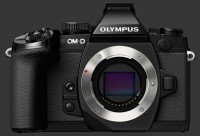
Olympus OM-D E-M1 is very speedy. It offers 10 FPS continuous shooting with a deep buffer for up to 95 images. Its superb 2.4 megapixels EVF has 100% coverage at 0.7X magnification while refreshing fast enough to follow action.
This combination of image-quality and performance, plus a mature system, allow the E-M1 to easily take its place as a professional digital camera.
| What you will like |
|---|
| Excellent image-quality |
| Superb image-stabilization |
| Good metering system |
| Reliable white-balance |
| Impressive EVF |
| Plenty of direct controls |
| Class-leading build quality |
| What you may not like |
| Slow AF with Four-Thirds lenses in low-light |
| Colors could be more accurate |
| Not Exposure-Priority |
| Overly complex |
| Relatively short battery-life |
Entry DSLR
Entry-Level DSLR cameras use the same large sensor as advanced models to give equally impressive image quality while remaining much faster than the majority of digital cameras, including mirrorless models. These cameras are often choice models for high image quality at a low cost, particularly for shooting moving subjects.
Entry and advanced DSLRs solidly held onto their spots as only a handful of new models were introduced and the megapixels race has been degrading absolute image-quality.
Best Entry-Level DSLR 2014
Pentax K-50
The Pentax K-50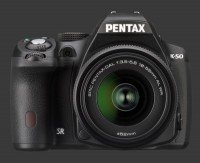
Pentax K-50 is a 16 megapixels APS-C DSLR which produces images of exceptional quality. While being the size and price of an entry-level model, the K-50 provides more professional features than its peers. This includes a 100% coverage viewfinder, a weather-sealed body which is freezeproof to -10C (14F), dual control-dials, built-in Shake Reduction and Automatic Horizon Correction.
Having the 100% coverage viewfinder and horizon correction improves photography by freeing the photographers from worries. The dual control-dials allow to operate the camera more efficiently while the weatherproof construction lets the K-50 be used in adverse weather With the use of a weather-sealed lens..
Its sensor produces images with low noise, class-leading dynamic-range and natural image colors. This is also one of the fastest models in its class with a top shutter-speed of 1/6000s and 6 FPS drive mode.
| What you will like |
|---|
| Excellent image noise |
| Exceptional dynamic range |
| Generally fast and responsive |
| Built-in Shake Reduction |
| Automatic Horizon Correction |
| 100% Coverage viewfinder |
| Weather-sealed and freezeproof |
| Support for both AA and Lithium-Ion batteries |
| Excellent ergonomics and controls |
| What you may not like |
| Autofocus speed below average |
| Comparatively limited lens lineup |
| Short battery-life with supplied battery |
| AA Batteries require optional adapter |
While no other entry-level DSLR has a comparable feature-set, the Pentax K-50 faces competition from the Pentax K-5 II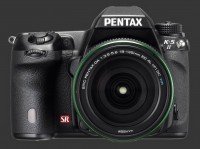
Pentax K-5 II which has dropped in price recently. It offers the same feature-set with more controls in a more durable body and even a dual IR-receivers and stereo sound-input.
Advanced DSLR
Today's Advanced DSLRs show exceptional image quality, great speed of operation and a wealth of features. These cameras are designed for efficient operation and can be used for all types of photography without much bulk. Choice of lenses abounds with a growing number specifically designed for cropped-sensor, saving cost and weight compared to comparable full-frame models.
The Pentax K-5 IIs remains the best digital camera among Advanced DSLRs. While a higher-resolution Pentax K-3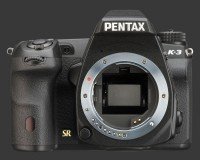
Pentax K-3 was recently launched, it only matches the performance of the K-5 IIs at low ISO sensitivity, showing more noise and softness starting at ISO 800.
Best Advanced DSLR 2014
Pentax K-5 IIs
The 16 megapixels sensor of the Pentax K-5 IIs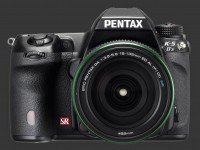
Pentax K-5 IIs takes image-quality to the next level for APS-C DSLRs by removing the usual anti-alias filter and maximizing sharpness.
The Pentax K-5 IIs brings unprecedented level of image quality to cropped-sensor DSLRs, challenging even larger full-frame cameras on many fronts. Plus, its keeps all the fantastic and unique features of the K-5 including built-in stabilization, automatic horizon correction, 100% coverage viewfinder and the best weatherproof protection among ILCs.
This DSLR has an extended ISO range that reaches 51200, plus the most sensitive autofocus system on the market, a dual-axis digital-level, 7 FPS drive and full 1080p HD video recording. The K-5 IIs has the most efficient controls of any current digital camera and excellent ergonomics.
| What you will like |
|---|
| Extremely low image-noise |
| Exceptional image sharpness |
| Class-leading dynamic-range |
| Built-in Shake Reduction |
| Automatic Horizon Correction |
| Ultra-sensitive autofocus system |
| Quite fast and responsive |
| Weather-sealed and freezeproof |
| Class-leading ergonomics and usability |
| What you may not like |
| Slow AF compared to high-end DSLRs |
| Higher potential for moire artifacts |
| Noticeable image review delay |
| Comparatively limited lens lineup |
Pentax simultaneously release the K-5 II
Pentax K-5 II which is identical except for its use of an anti-alias filter like most digital cameras which use a Bayer color-filter-array.
Professional DSLR
Professional full-frame DSLRs feature the best image quality and performance for demanding photographers. The trade-offs are always increased cost of both camera and lenses as well as added bulk. These cameras are extremely versatile and with the right lenses, suitable for all types of photography.
Nikon refreshed their top-of-the-line DSLRs, producing the D4S and D810 which neatly exceed the performance of their predecessors.
Best Professional DSLR 2014
Nikon D4S
The Nikon D4S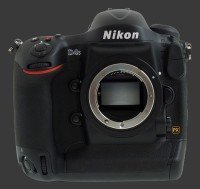
Nikon D4S embodies DSLRs like no other and takes the essential qualities of professional digital cameras to the extreme:
- Stellar low-light performance with a maximum ISO sensitivity of 409,600!
- Blazing-fast autofocus that works in low-light.
- Ultra-fast continuous drive up to 11 FPS.
- Solid and durable weatherproof construction.
- Choice of lenses among one of the industry's largest lineups.
This DSLR is literally and figurative a heavy-weight. Without a doubt, it delivers images of outstanding quality and top-notch performance. Its large body includes integrated vertical grip which puts a great number of controls at your finger-tips.
The Nikon D4S is extremely feature rich, including the requisite 100% coverage viewfinder and dual control-dials on both grips for this type of camera, plus full 1080p HD capture with uncompressed HDMI output, a built-in viewfinder shutter and an Ethernet port for remote control and image transfer. It is only lacking a built-in flash and freeze-proof construction.
| What you will like |
|---|
| Extremely low image noise |
| Superb dynamic-range |
| Class-leading 11 FPS continuous drive |
| Fast 51-point autofocus with 3D subject-tracking |
| Ultra-fast and responsive |
| Wealth of external controls |
| Uncompressed full 1080p HD video over HDMI |
| Extremely solid weather-proof construction |
| What you may not like |
| Poor automatic white-balance in low-light |
| Stiff 8-way joystick and indistinct ISO button |
| Second card-slots requires XQD memory |
| No built-in flash |
| Quite heavy and bulky |
Runner Up
Nikon D810
The Nikon D810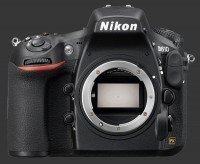
Nikon D810 replaces both D800E and D800 twins. Like the D800E, the new D810 lacks an anti-alias filter to deliver maximal image-sharpness. Its expanded ISO 32-51200 range offers the lowest ISO among digital cameras to minimize image-noise and maximize dynamic-range.
The D810 provides the most refined control over image-rendering, with 6 image parameters having between 13 and 41 fine-grained steps. It also offers 2-axis WB Fine-Tuning with 25 steps along each axis. This applies to JPEG shooters and is intended to reduce the desire for RAW files which are gigantic.
While physically smaller than the D4S, the D810 is really a professional DSLR too. Its weather-sealed body includes a 100% coverage viewfinder with built-in shutter, dual control-dials and even a built-in flash.
| What you will like |
|---|
| Class-leading resolution |
| Excellent image sharpness |
| Spectacular dynamic-range |
| Fast 51-point autofocus with 3D tracking |
| Very fast and responsive |
| Solid build quality |
| Uncompressed full 1080p HD video over HDMI |
| What you may not like |
| Poor automatic white-balance in low-light |
| Slow 5 FPS maximum speed at 36 MP |
| Asymmetric card-slots use CF & SDXC |
| Inconsistent Live-View |
| Demands the highest quality lenses |
Best Digital Cameras By Photography Subject
Each class of digital camera fits the needs of certain users. This is one reason buyers often look for a specific type of digital camera. Another reason is the preconceived notion that one type performs a certain way. In fact, that is mostly true but 2012 has blurred these boundaries like never before.
With this in mind, we award cross-category distinctions here for common photography subjects. Most winners from last year kept their top-spot but are now more affordable. Here they are in no particular order:
Best Landscape Photography Digital Camera - Nikon D810
Nikon D810

The newly minted ultra-high resolution full-frame DSLR with its uniquely low ISO sensitivity becomes the best digital camera for landscape photography. It requires the ultimate in lens-quality to deliver its top performance which rewards the photographer with richly-detailed and exceptionally large prints.
Best Travel Photography Digital Camera - Pentax K-5 IIs
Pentax K-5 IIs
Travel photography images are taken under a variety of conditions with more constraints than most. The Pentax K-5 IIs is ideal for travel photography since it can produce outstanding images down to very low light thanks to its class-leading high-ISO performance and built-in stabilization that even works with the brightest lenses. It is also similar in size to an entry-level DSLR except with extremely efficient controls.
Traveling photographers are more at the mercy of the weather than most and the K-5 family handles it better than any other interchangeable lens camera.
Best Street Photography Digital Camera - Fujifilm X-T1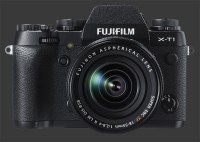
Fujifilm X-T1
Street photography requires quick speed, light weight and discretion. A DSLR provides the former but struggles with the latter two. Mirrorless cameras provide the opposite. The Fuji X-T1 takes exception to this by delivering truly fast autofocus while remaining compact. Both eye-level and hip-level shooting are possible with the X-T1 thanks to an exceptional EVF and tiltable LCD. Its unique APS-C CMOS sensor delivers highly-detailed image-quality with class-leading sharpness.
Best Action Photography Digital Camera - Nikon D4S
Nikon D4S
Action photography, particularly indoor action photography, is the most demanding of a digital camera. To freeze action, a camera needs a fast shutter-speed which requires a high-ISO for proper exposure when light is not so bright. Just as importantly, it needs to have the subject in focus and fire quickly to capture action at its peak.
Best Social Digital Camera - Sony Cybershot DSC-RX100 III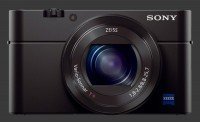
Sony Cybershot DSC-RX100 III
With so many people using cellular-phones to immortalize social occasions, one could be forgiven to think that photography in typical social settings is demanding. A combination of low light and moving subjects normally calls for a DSLR but carrying one into a social setting is awkward at best. The Sony RX100 Mark III strikes the ultimate compromise under these circumstances by fitting a large sensor in a very compact camera. The Mark III version adds a built-in popup EVF for even more versatility compared to its predecessor.
Please Support Neocamera
All information on Neocamera is provided free of charge yet running this website is a huge endeavor. Purchases made via affiliate links found throughout the site help keep it running and up-to-date. There is no additional cost to you, so please consider buying via these links to our affilates:
If you found any information on this site valuable and did not purchase via our affiliate links, please considering donating via PayPal:
Any amount will be greatly appreaciated. Thank you for your support!
Updates
2025.01.18

Fujifilm GFX 2025 Lens Roundup
Lens Review roundup of Fujifilm GFX Medium-Format lenses. Quality, performance and handling of the GF20-35mm F/4R WR, GF30mm F/3.5 Tilt-Shift and the GF55mm F/1.7.
2024.11.18

Best 2024 Photography Gifts for Every Budget
Great gifts for photographers and photo enthusiasts selected for every budget among the best products of 2024.
2024.08.07

Eye Protection Tips for Professional Photographers
The four main considerations for professional photographers regarding eyewear.
2024.07.14

Fujifilm X100VI Review
Flagship fixed-lens compact digital camera with a 40 MP sensor and Image-Stabilization, a first for the series. Retro design featuring dual control-dials, plus direct ISO, Shutter-Speed and EC dials. Its hybrid viewfinder can switch between EVF and OVF mode.
2024.05.09

Fujifilm GFX100 II Review
Flagship 102 Megapixels Medium-Format Mirrorless Digital Camera with 8-Stop 5-Axis IBIS, 8 FPS Drive, 8K Video and 400 MP Super-Resolution capture in a weatherproof and freezeproof body with dual control-dials and dual memory-card slots.
2024.04.03

Fujifilm X-T5 Review
Newest Fujifilm flagship boasting a 40 MP APS-C sensor, 5-axis IBIS with 7-stop efficiency, 15 FPS continuous drive, 6.2K Video capture, dual control-dials and dual SDXC UHS-II slots in a sturdy weatherproof and freezeproof body.
2023.11.20

Best Digital Cameras of 2023
Find out which are the Best Digital Cameras of 2023. All the new Mirrorless Digital Cameras from entry-level to high-end professional.
2023.07.10

Fujifilm X-H2 Review
40 Megapixels APS-C Hybrid Mirrorless Digital Camera with 7-stop IBIS. Fastest shutter ever and 8K video capture. Large builtin EVF with 0.8X magnification and 5.8 MP, plus an Eye-Start Sensor. Packed with features and large number of controls in a weatherproof and freezeproof body.
2023.05.07

Sony FE 20-70mm F/4G Review
Review of the unique Sony FE 20-70mm F/4G lens. The optical zoom of this lens spans ultra-wide-angle and medium focal-length coverage, making it one of the most versatile Full-Frame lenses on the market.
2023.01.15

Huion Inspiroy Dial 2 Review
Review of the Huion Inspiroy Dial 2 tablet, a medium sized drawing surface with dual dials and customizable buttons. Connects via USB-C or Bluetooth 5.0 with Windows, Linux and Android support.
2022.12.08

How to Pack for a Photo Trip
Find out how to pack for a travel photography trip, carry your gear safely while meeting airline regulations.
2022.11.13

Best Digital Cameras of 2022
The best digital cameras of 2022. A short list of the most outstanding models in their respective categories. Choose one for yourself or as a gift.
2025.01.18
2024.11.18
2024.08.07
2024.07.14
2024.05.09
2024.04.03
2023.11.20
2023.07.10
2023.05.07
2023.01.15
2022.12.08
2022.11.13
NEWS
2025.04.22

Sony Unveils Brightest Full-Frame Telephoto Zoom Lens
Lens
2025.04.03

Nikon Released Second Generation Z5 Full-Frame Mirrorless
Digital Camera
2025.03.26

Canon Launches Pair of Cameras and Lenses
Digital Camera ○ Lens
2025.03.25

Venus Optics Launches Vista Vision Cine Lenses
Lens
2025.03.24

Think Tank Photo Walker Pro
Bag
2025.03.20

Fujifilm First Fixed Lens Medium-Format Camera
Digital Camera
2025.02.26

Sony Launches Two New Lenses at CP+2025
Lens
2025.02.25

CP+2025 Showcases Numerous Launches
Digital Camera ○ Lens
2025.02.13

Nikon Launches 5X Full-Frame Power-Zoom Lens
Lens
2025.02.05

Nikon Refreshes Flagship Ultra-Zoom
Digital Camera
2025.02.05

Nikon Launches Ultra-Bright 35mm F/1.2 Prime Lens
Lens
2025.01.21

Fujifilm Evolves INSTAX Wide
Digital Camera



